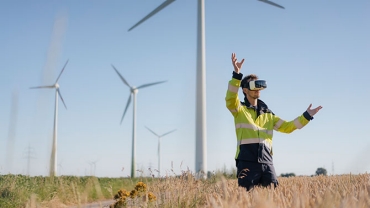
Sustainable entrepreneurship can no longer be avoided
11/03/21
CEOs realise that non-financial risks can also affect the value of their organisation
Although the COVID-19 pandemic was at the forefront for most CEOs last year, issues such as climate change and the environment are still on their agendas. This is evident from PwC’s 24th CEO Survey. Organisations can no longer avoid those issues. Both (European) legislation and investor demands is pushing these issues to the forefront. ‘Green’ is no longer just something for do-gooders’, according to Viviana Voorwald and Joukje Janssen, specialists in the field of ESG and sustainability.
Not so long ago, organisations that deliberately opted for sustainable business practices could be counted on one hand. Their CEOs were regarded as idealists. They deliberately chose not to maximise shareholder value, but to contribute to a better world.
That group of organisations is now expanding rapidly, and the underlying reasons for making this choice has shifted. Organisations are realising that they have to make a change because of new regulations, but also because of investor demands. CEOs are also increasingly realising that non-financial risks and opportunities can have a significant effect on the value of their organisation.
Transition to a sustainable European economy
As early as 2018, the European Union launched its action plan to finance sustainable growth. This EU sustainable finance taxonomy requires organisations to explain in detail how they score on ESG themes (environmental, social, governance), starting with climate change. Initially, this regulation will apply to the financial sector only, but it will be broadened and apply to listed companies as early as 2022. With this classification system, the EU wants to support the transition to a sustainable European economy.
High score on ESG criteria
At the same time, investors such as pension funds and private equity firms are increasingly incorporating ESG themes into their acquisition or investment strategies. When making choices, they increasingly look to companies that score high on criteria such as CO2 reduction, climate analysis, human rights, diversity and other ethical concerns. There have already been cases of transactions being cancelled for this reason.
Report on the risks of climate change
These developments put a great burden on organisations. Within a year, organisations must be able to retrieve ‘green’ data from their systems if asked for it. They must then be able to indicate which part of their turnover, Opex and Capex classifies as ‘green’. They must also report on the risks of climate change for the company.
In many organisations that process is not yet properly arranged and if they have not yet started to set up their administration already, they must do so as soon as possible. The regulator does not want to adjust its pace and only wants to come up with more regulations. This leads to a need for ESG information within the organisations.
For you as a CEO, it is vital that this is explicitly on your agenda. The following steps can be of help:
1. Create awareness among your board members
Is everyone aware that regulators and investors are going to ask a lot of questions about your contribution to a better and fairer world? And do they realise what the consequences are if your organisation cannot give a satisfactory answer to these questions?
Also, take into account other stakeholders and your image. People may not want to work for you if you are not sustainable enough. Or you may lose clients because companies no longer want you as a supplier in their supply chain.
2. Make your ambition and strategy clear
Do you opt for the minimum requirements or do you want to be at the forefront when it comes to corporate responsibility? Communicate your strategy clearly and don’t forget the internal organisation. For example, does everyone in your company know what ESG is? Good communication ensures that your employees also feel responsible for achieving your sustainability objectives.
3. Determine your measures for both the short and long term
If your ambition is clear, you can first focus on the easy measures. You can start by defining a sustainability strategy and look very specifically for the ESG criteria that will have the greatest impact on your company. Then you can make a plan for the long term. In any case, do not start by being too ambitious, otherwise you run the risk of pursuing useless perfection.
4. Ensure that your processes and systems are up to standard
It is easier said than done. In many cases, organisations cannot answer relatively simple but important questions based on their own non-financial data. Because clear definitions are lacking, or because the data are not accurate. Or because systems that have been connected over time don’t communicate well with each other.
Getting this all sorted is a tough call. But well worth it in the end. You can manage your organisation far better and monitor whether you are achieving your sustainability goals. Managing only financial KPIs is something of the past.
No time to lose
As many standards are still missing and future developments are unclear, it is difficult to arrange everything properly right away. But that doesn't mean that you shouldn't start with the first steps. Given the developments, you have no time to lose and every step is a step forward.
Also realise that a head start in this area offers you many opportunities when it comes to, for example, investment opportunities or attracting talent. This has also triggered the attention of the non-idealists. Having a high ESG ambition ultimately has a value-enhancing effect on the organisation.

Climate and environment have not disappeared from CEOs' agenda
Climate change and environmental pollution have not disappeared from CEOs' agendas during the Covid-19 era, according to PwC's 24th CEO Survey. The topic is still relatively high on corporate executives' list of top concerns, although corona-related topics seem to be demanding more attention.
More than half of the 141 Dutch respondents indicate that they want to invest more in sustainability in the coming years. In the survey, about half of CEOs indicate that they want to measure and report more in terms of their impact on the environment.
Contact






















